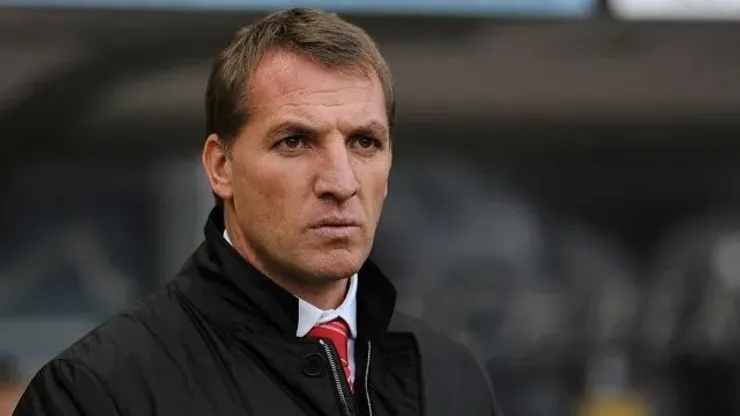Monday saw Arsenal and Liverpool play out one of the better 0-0 draws in recent memory, with each side laying reasonable claim to dominating a half and finishing deserving winners. It could have finished 1-1, 3-3, or 4-2, to either side, and the fact that it ended goalless only added to the intrigue. Viewers were kept interested until the very last minute, when Arsenal only just failed to convert on a corner.
Through a combination of defensive resolve and sheer luck (a desperate clearance by Martin Skrtel could easily have gone into his own net), Liverpool recorded their first clean sheet against Arsenal since the 2011-12 season, and large amounts of credit for that achievement should go to the manager.
Brendan Rodgers refrained from making any David Brent-esque comments before the game, but rather spoke plainly about the need to dominate space against Arsenal, rather than control of the football. He said:
“If you assess games against Arsenal we have always had dominance of the ball, especially at home. If you assess the last 10 games Arsenal have lost at home, it was about dangerous possession for the teams who won.
They only averaged four shots on target with 43% possession. That tells you you don’t need to dominate the ball but you can dominate the space. That is important in the away games. Tactically we’ll arrive in a good mind about how we can win it. There are certain games you look at the approach to get you the result and that is something we have been working on this week.”
The Northern Irishman was true to his word. Liverpool didn’t seem to view holding possession with any importance on Monday evening, with 34% compared to the Gunners’ 66%. Yet they were almost as potent as their hosts, taking 15 shots to Arsenal’s 19 (far more than the four Rodgers estimated would be enough). And one more of Liverpool’s shots came inside the penalty box, 11 to 10 for Arsenal. On any other night, and if Petr Cech hadn’t been on top form, Liverpool would have scored despite completing over 200 fewer passes.
Rodgers’ point in his pre-match words was not just about conceding possession but about trading possession for dominance of key areas of the pitch. Despite not having the ball, Liverpool as a side still played fairly high up the field, with Skrtel acting as the deepest outfield player and a last-ditch penalty box protector (he made the most clearances in the game).
Liverpool allied their positioning with high pressing, reminiscent of their fast starts to the 2013-14 season, ensuring that Arsenal’s front six did not have a lot of time on the ball to thread a pass and expose Liverpool’s high line (aside from when Ramsey slid in a goal that was incorrectly ruled offside).
It seems like a fool-proof strategy, press high up the pitch, win the ball back close to your opponent’s goal and launch a counter-offensive. Why doesn’t everyone do it?
Because Arsenal had 19 shots, and 10 of them inside the box. Even though Liverpool matched Arsenal offensively, and had a great defensive strategy in theory, they were still worryingly open. A basic tenet of soccer is that the side without the ball cannot score. If one side doesn’t demand possession, they drastically limit the time within the game that they can score.
Only 34% of the ball meant that there was roughly half an hour of the match where a Liverpool goal was even theoretically possible, while Arsenal had an hour to work their way through the Liverpool rear guard. A few of Liverpool’s first half-opportunities came from Arsenal just giving the ball away under very little pressure, rather than any demon pressing.
Once Arsenal composed themselves after halftime, they were far more measured against Liverpool’s tactics, aiming to retain and recycle possession, and creating by far the better opportunities. Having committed to chasing the ball rather than keeping it, Liverpool were increasingly less influential, to the point where goalkeeper Simon Mignolet was booked for time-wasting in the 85th minute.
Ideally, Liverpool would have scored an early goal and then reverted to type, preserving their advantage and taking care of the ball. However, the gamble of heavy running early on didn’t pay off, and their tired legs were becoming increasingly easy pickings for Arsenal towards the end of the game.
200+ Channels With Sports & News
- Starting price: $33/mo. for fubo Latino Package
- Watch Premier League, Women’s World Cup, Euro 2024 & Gold Cup
The New Home of MLS
- Price: $14.99/mo. for MLS Season Pass
- Watch every MLS game including playoffs & Leagues Cup
Many Sports & ESPN Originals
- Price: $10.99/mo. (or get ESPN+, Hulu & Disney+ for $14.99/mo.)
- Features Bundesliga, LaLiga, Championship, & FA Cup
2,000+ soccer games per year
- Price: $5.99/mo
- Features Champions League, Serie A, Europa League & Brasileirāo
175 Premier League Games & PL TV
- Starting price: $5.99/mo. for Peacock Premium
- Watch 175 exclusive EPL games per season






